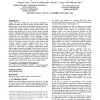114
click to vote
GROUP
2009
ACM
15 years 8 months ago
2009
ACM
Previous research has explored how technology can motivate healthy living in social groups such as friends and coworkers. However, little research has focused on the implications ...
104
click to vote
GROUP
2009
ACM
15 years 8 months ago
2009
ACM
As organizations scale up, their collective knowledge increases, and the potential for serendipitous collaboration between members grows dramatically. However, finding people wit...
106
Voted
GROUP
2009
ACM
15 years 8 months ago
2009
ACM
As a foundation for the design of groupware, we need a new science of group interaction, a systematic description of the processes at the group level of description that may contr...
105
click to vote
GROUP
2009
ACM
15 years 8 months ago
2009
ACM
This paper describes research focused on understanding the role of incomplete structural information about online collective action systems in participation decisions. Specificall...
GROUP
2009
ACM
15 years 8 months ago
2009
ACM
A collaborative system must perform both processing and transmission tasks. We present a policy for scheduling these tasks on a single core that is inspired by studies of human pe...
118
click to vote
GROUP
2009
ACM
15 years 8 months ago
2009
ACM
Interdisciplinary design has created challenges in design collaboration due to the difficulty in communicating and coordinating across disciplines. Many tools have been developed ...
116
click to vote
GROUP
2009
ACM
15 years 8 months ago
2009
ACM
A mundane but theoretically interesting and practically relevant situation presents itself on social networking sites: the co-presence of multiple groups important to an individua...
133
click to vote
GROUP
2009
ACM
15 years 8 months ago
2009
ACM
Scientific peer review, open source software development, wikis, and other domains use distributed review to improve quality of created content by providing feedback to the work�...
115
click to vote
GROUP
2009
ACM
15 years 8 months ago
2009
ACM
Coping with a new health issue often requires individuals to acquire knowledge and skills to manage personal health. Many patients turn to one another for experiential expertise o...
105
click to vote
GROUP
2009
ACM
15 years 8 months ago
2009
ACM
Recent technologies supporting continuous connectivity enable sustained awareness within social networks, which eventually boosts interaction and therefore the need of individuals...


